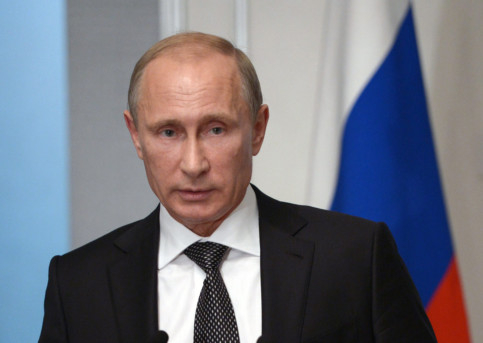
There is a Russian proverb: “If you can’t face the wolf don’t go into the forest.” The West has blundered into the Ukrainian forest and enraged the Russian wolf, only to discover that we cannot face him. We should now be looking for the path out. Western policy has been built on two false premises. The first is that we must stop a revanchist Russia. As this narrative runs: yesterday Russia took Crimea; today Eastern Ukraine; tomorrow - who knows - Estonia, Poland? This precisely mirrors the Russian nightmare of predatory Nato expansion; yesterday Poland and Estonia, today Georgia, tomorrow - who knows - parts of Russia itself?
The mutual suspicions of 1914 spring worryingly to mind. In fact, before what the Russians (with some justification) saw as a Western grab last February for control in Kiev, there was no evidence of Russian revanchism. Those who point to Georgia are wrong - it was the Georgians who started the 2008 war. Meanwhile, Ukraine is a uniquely sensitive case for Russia; the countries are bound by deep social, cultural, and historical ties. Kiev is known as the “mother of Russia cities”. And even in Ukraine the Russians want influence, not actual territory. The “we must stand up to Putin as we did to Hitler” line is pure schoolboy politics. Putin, of whom I saw a fair amount as UK ambassador to Moscow, is not an ideologically driven fanatic, but much closer to Talleyrand - the calculating, pragmatic rebuilder of his country’s status in the world. Certainly the seizure of Crimea was illegal and destabilising. But it was a panicky response to a unique set of circumstances, not the start of an attempt to rebuild the USSR. Of course we are right to reassure those who feel most threatened - as Nato has done with its decision to create a “spearhead force”.
We are right to condemn the destruction of MH17, which a report confirmed yesterday was almost certainly shot down. But the idea that sabre-rattling is necessary to convince Russia of Nato’s seriousness is ridiculous. If the Russians didn’t take the Nato security guarantee seriously, why would they be so worried about Ukraine joining? The second false premise is that economic sanctions can stop Russia. We have deployed sanctions six times against Russia since the Second World War; they have never worked, and won’t this time. There was an air of desperation around claims at last weekend’s Nato summit in Newport that sanctions pushed Russia into the current ceasefire. In reality the US, UK and Ukraine resisted a ceasefire that left Russia in command of the field in East Ukraine. Ukraine only moved to accept the ceasefire because it suddenly started losing the war. Sanctions are a potemkin policy, deployed in the absence of any effective alternative. They have probably done some economic damage, but their sole political effect has been to rally the Russian people behind their president, and reinforce Putin’s conviction that this is a struggle he cannot afford to lose, whatever the cost. Even the Russian opposition don’t support them. It has become clear in the past two weeks that the Russians are ready to go to the brink to achieve their political objectives in Ukraine. Few believe we should go to the brink to stop them.
So all we can do is prolong the agony and further immiserate Ukraine. Happily, the gap between the fiery rhetoric of the Newport summit and the moderation of its actual decisions implicitly acknowledged this. The spearhead force will, despite Polish demands, not be sat on Russia’s frontiers. There will also be Nato help for Ukraine’s armed forces, but no serious weaponry (as they would still lose).
Meanwhile, the summit did not refer at all to the most neuralgic point for Russia, Nato membership for Ukraine. And Nato members have rather belied their declared fears of a revanchist Russia by their reluctance to spend more on defence. When I went to such summits a commitment, as in the Nato communique, to “aim to” raise spending amounted to a decision to do nothing. And as many commentators have noted, Russia’s objectives - a neutral Ukraine, and constitutional safeguards for the population in the East - are not impossible to meet. We do deals with China, with Iran, with North Korea. Uncomfortable as it may be, the time has come to do a deal with Putin. Part of this should be easy; Ukraine is in any case going to be in no condition to join Nato for the foreseeable future.
Negotiating an acceptable level of autonomy for East Ukraine will be much harder. The Russians are in possession, and will not let go until their concerns are met. Meanwhile Ukraine’s President Poroshenko has to deal with a nationalist Right whom every concession will enrage. Here, finally, sanctions could be of some use, with the offer to lift them helping to lubricate the way towards an agreement.
The whole affair raises serious questions about the competence of Western policymaking towards Russia. The one route out of this mess has been visible for months. But let us not recriminate. There are still big prizes to play for. A democratic, prosperous, Western-leaning (but not allied) Ukraine is bound to become an important exemplar for the Russians next door. And the reopening of Western economic ties with Russia is crucial to the process of pulling that country, however slowly and erratically, towards European normality too. — The Telegraph Group Limited, London 2014 Tony Brenton is a former British ambassador to Russia.








